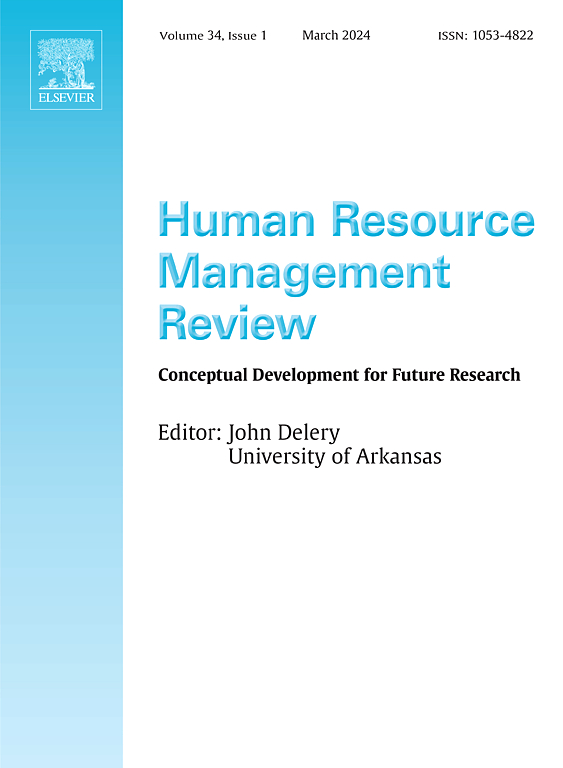Ethical approaches to leadership in organizational contexts: An attachment theory perspective
IF 13
1区 管理学
Q1 MANAGEMENT
引用次数: 0
Abstract
Ethical approaches to leadership in organizational contexts have been linked to a wide range of positive outcomes for both organizations and their followers. The primary thesis of this paper is that insights gleaned from attachment theory shed light on the evolutionary and developmental origins, emergence and occurrence of ethical approaches to leadership in organizational contexts. Based on an extensive literature review, we identify important conceptual advances that provide insights into how attachment-based relational models contribute to the emergence and development of antecedents and core-themes of ethical approaches to leadership. Furthermore, we outline theoretical connections, present our rationale for the suggested relationships, and develop meaningful propositions useful for future empirical investigations. Theoretical and practical implications are discussed. This work allows us to consider how organizations and human resource management programs can proactively address and support the needs of the new “attachment -insecure” era of organizational workers in a way that positively affects organizational outcomes.
组织情境下的领导伦理研究:依恋理论视角
在组织环境中,领导的道德方法与组织及其追随者的广泛积极成果有关。本文的主要论点是,从依恋理论中收集的见解揭示了组织环境中领导伦理方法的进化和发展起源,出现和发生。基于广泛的文献回顾,我们确定了重要的概念进展,这些进展提供了对基于依恋的关系模型如何促进领导伦理方法的前提和核心主题的出现和发展的见解。此外,我们概述了理论联系,提出了我们建议的关系的基本原理,并提出了对未来实证调查有用的有意义的命题。讨论了理论和实践意义。这项工作使我们能够考虑组织和人力资源管理计划如何以积极影响组织成果的方式,主动解决和支持新“依恋-不安全”时代组织员工的需求。
本文章由计算机程序翻译,如有差异,请以英文原文为准。
求助全文
约1分钟内获得全文
求助全文
来源期刊

Human Resource Management Review
MANAGEMENT-
CiteScore
20.20
自引率
7.00%
发文量
0
审稿时长
48 days
期刊介绍:
The Human Resource Management Review (HRMR) is a quarterly academic journal dedicated to publishing scholarly conceptual and theoretical articles in the field of human resource management and related disciplines such as industrial/organizational psychology, human capital, labor relations, and organizational behavior. HRMR encourages manuscripts that address micro-, macro-, or multi-level phenomena concerning the function and processes of human resource management. The journal publishes articles that offer fresh insights to inspire future theory development and empirical research. Critical evaluations of existing concepts, theories, models, and frameworks are also encouraged, as well as quantitative meta-analytical reviews that contribute to conceptual and theoretical understanding.
Subject areas appropriate for HRMR include (but are not limited to) Strategic Human Resource Management, International Human Resource Management, the nature and role of the human resource function in organizations, any specific Human Resource function or activity (e.g., Job Analysis, Job Design, Workforce Planning, Recruitment, Selection and Placement, Performance and Talent Management, Reward Systems, Training, Development, Careers, Safety and Health, Diversity, Fairness, Discrimination, Employment Law, Employee Relations, Labor Relations, Workforce Metrics, HR Analytics, HRM and Technology, Social issues and HRM, Separation and Retention), topics that influence or are influenced by human resource management activities (e.g., Climate, Culture, Change, Leadership and Power, Groups and Teams, Employee Attitudes and Behavior, Individual, team, and/or Organizational Performance), and HRM Research Methods.
 求助内容:
求助内容: 应助结果提醒方式:
应助结果提醒方式:


